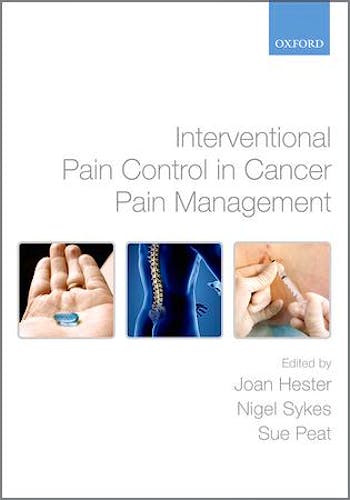

No hay productos en el carrito



Interventional Pain Control in Cancer Pain Management
Hester, J. — Sykes, N. — Peat, S.
1ª Edición Diciembre 2011
Inglés
Tapa dura
286 pags
1200 gr
18 x 25 x 2 cm
ISBN 9780199219087
Editorial OXFORD
LIBRO IMPRESO
-5%
147,64 €140,26 €IVA incluido
141,96 €134,87 €IVA no incluido
Recíbelo en un plazo de
2 - 3 semanas
About this Book
- A guide for healthcare professionals on the range of interventional pain management techniques available, with evidence of efficacy, side effects and management advice
- Case studies are used to demonstrate the complex decision-making processes involved in pain management, and to give examples of good and bad pain management
- Contains a plate section of colour images, to demonstrate real-life procedures and the equipment used
The effective management of pain from cancer is a top priority for patients, carers and healthcare professionals, and has been the subject of extensive research. Approximately two-thirds of cancer patients will experience severe pain, and many of them will have more than one pain. However, because of the increasing number of available treatments for cancer, patients are surviving for longer periods, and are developing complex consequences of their cancer and its treatment, such as central and peripheral neuropathic pain syndromes. Approximately 8 - 10% of cancer pain remains unrelieved by conventional means.
Interventional cancer pain management implies the use of invasive techniques, such as neuraxial (epidural, intrathecal and intracerebroventricular) drug administration, brachial and lumbar plexus blocks, autonomic blockade, neurolytic blocks and cordotomy. It can also include TENS, acupuncture and complementary therapies. This book describes specifically the difficult pain problems that are now faced in palliative care and highlights the need for greater collaboration between the disciplines of pain medicine and palliative care. It refers to the psychological and spiritual needs of patients, and provides patient experience data on specialist techniques. The book is an invaluable resource for all healthcare professionals working in palliative care, pain management, and primary care to inform them about the range of interventional techniques available, with evidence of efficacy, side effects and management advice.
Readership: This book will be of interest to all healthcare professionals in pain management, palliative care, and primary care.
Table of Contents
1: Nigel Sykes: Setting the scene
2: Sue Peat and Joan Hester: Difficult pain problems
3: Joan Hester: Interventional pain control: background and current role
4: Catherine Urch: Pain mechanisms
5: Paul Farquhar-Smith: Neuraxial (epidural and intrathecal) infusions I: anatomy,
pharmacokinetics, evidence-base and commonly used drugs
6: Joan Hester: Neuraxial (epidural and intrathecal) infusions II: patient selection,
epidural versus intrathecal, equipment, description of the technique, complications,
national use
7: Julie O'Neill and Margaret Gibbs: Practical nursing management of epidural
and intrathecal infusions
8: Sue Peat, Kevin Fai and Joan Hester: Peripheral blocks, plexus blocks, and
intrathecal neurolysis
9: Richard Griffiths, Jon Norman and Kevin Fai: Blocks of the sympathetic nervous
system / autonomic blockade
10: Mike Williams and Derek Pounder: Cordotomy
11: Nicholas Padfield: The use of peripheral nerve and spinal cord neuromodulation
in cancer pain
12: Mark I. Johnson, Jacqueline Filshie and John W. Thompson: Transcutaneous
Electrical Nerve Stimulation (TENS) and acupuncture
13: Rosanna Heal: The patient's perspective
Appendix 1 - Body dermatomes
Author Information
Edited by Joan Hester, Consultant in Pain Medicine, King's College Hospital, London, UK, Nigel Sykes, Consultant in Palliative Medicine, St. Christopher's Hospice; and Honorary Senior Lecturer in Palliative Medicine, King's College, University of London, UK, and Sue Peat, Consultant in Pain Medicine, King's College Hospital, London, UK
Dr Joan Hester has worked in the National Health Service for over 40 years,
and was originally a Consultant in Anaesthesia and Pain Management at Eastbourne,
East Sussex, where she was also Medical Director, until moving to London in
2004. Joan now works as Consultant in Pain Medicine at King's College Hospital
in London and is the Immediate Past President of the British Pain Society. She
has a national and international reputation for her work in promoting understanding
and education in pain management, and is a board member of the new Faculty of
Pain Medicine at the Royal College of Anaesthetists. Joan has a life-long interest
in cancer pain and palliative care, was co-founder of St Wilfrid's Hospice,
Eastbourne, and currently works at St Christopher's Hospice in London, providing
specialist pain management advice, education and support.
Dr Sykes' principal research interests concern gastrointestinal and end of life
symptom management in palliative care, on which he has written extensively.
He also teaches widely both in the UK and abroad. Currently chair of Help the
Hospices International Palliative Care Reference Group, he is also a member
of the Neurological Diseases Strategy Group of the UK National Council for Palliative
Care. Dr Sykes has served as Treasurer of the Association of Palliative Medicine
of Great Britain and Ireland, and as a member of the Association's Executive
and Ethics committees. He set up the first clinical ethics committee to be located
in a hospice and has spoken on television and radio, and made presentations
to British parliamentary committees, on ethical issues relating to palliative
care.
Dr. Sue Peat studied medicine and pharmacology at St. Batholomew's Hospital, London. She developed an interest in interventional techniques and opioid metabolism whilst undertaking higher professional training in anaesthesia at King's College Hospital. Following a period as a research fellow in the pain relief unit there she was appointed as a consultant anaesthetist specializing in pain relief, obstetric anaesthesia and undergraduate teaching. Her long connection with St. Christopher's Hospice has enabled the development of an integrated service which crosses the boundaries between acute, chronic and cancer pain management. This offers palliative patients the benefit of expertise and techniques more commonly available only in an acute pain setting.
© 2025 Axón Librería S.L.
2.149.0